Manjun Cui
Multiple-Parameter Graph Fractional Fourier Transform: Theory and Applications
Jul 31, 2025Abstract:The graph fractional Fourier transform (GFRFT) applies a single global fractional order to all graph frequencies, which restricts its adaptability to diverse signal characteristics across the spectral domain. To address this limitation, in this paper, we propose two types of multiple-parameter GFRFTs (MPGFRFTs) and establish their corresponding theoretical frameworks. We design a spectral compression strategy tailored for ultra-low compression ratios, effectively preserving essential information even under extreme dimensionality reduction. To enhance flexibility, we introduce a learnable order vector scheme that enables adaptive compression and denoising, demonstrating strong performance on both graph signals and images. We explore the application of MPGFRFTs to image encryption and decryption. Experimental results validate the versatility and superior performance of the proposed MPGFRFT framework across various graph signal processing tasks.
Graph Chirp Signal and Graph Fractional Vertex-Frequency Energy Distribution
Mar 10, 2025

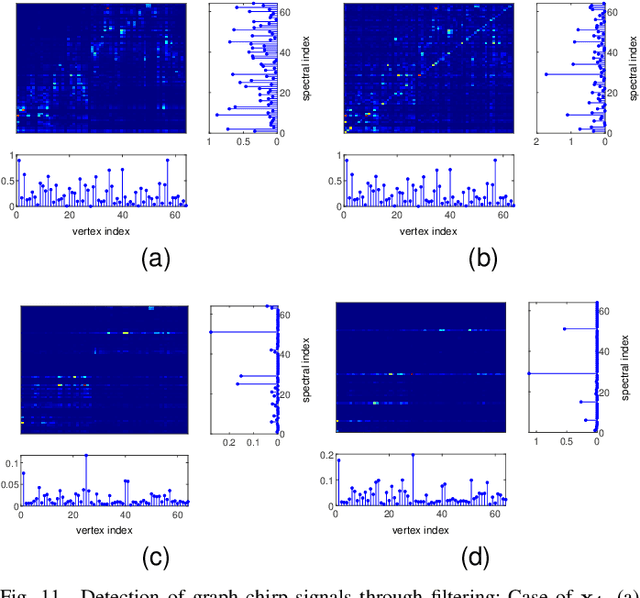

Abstract:Graph signal processing (GSP) has emerged as a powerful framework for analyzing data on irregular domains. In recent years, many classical techniques in signal processing (SP) have been successfully extended to GSP. Among them, chirp signals play a crucial role in various SP applications. However, graph chirp signals have not been formally defined despite their importance. Here, we define graph chirp signals and establish a comprehensive theoretical framework for their analysis. We propose the graph fractional vertex-frequency energy distribution (GFED), which provides a powerful tool for processing and analyzing graph chirp signals. We introduce the general fractional graph distribution (GFGD), a generalized vertex-frequency distribution, and the reduced interference GFED, which can suppress cross-term interference and enhance signal clarity. Furthermore, we propose a novel method for detecting graph signals through GFED domain filtering, facilitating robust detection and analysis of graph chirp signals in noisy environments. Moreover, this method can be applied to real-world data for denoising more effective than some state-of-the-arts, further demonstrating its practical significance.
Adaptive Cohen's Class Time-Frequency Distribution
Aug 08, 2024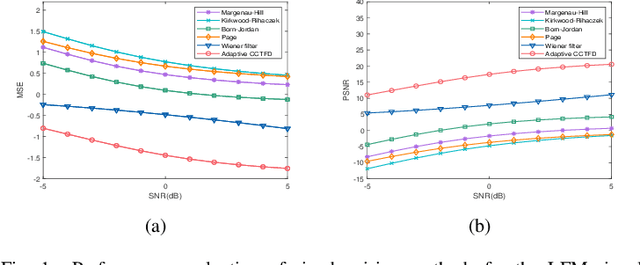
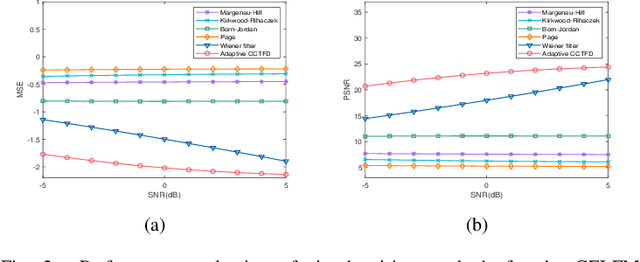
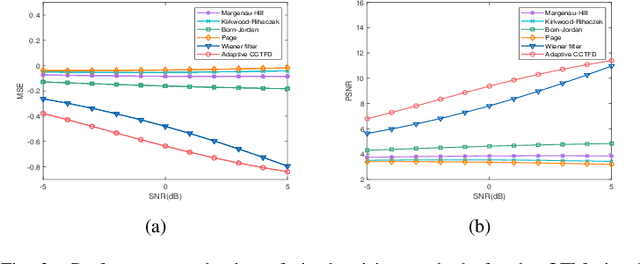
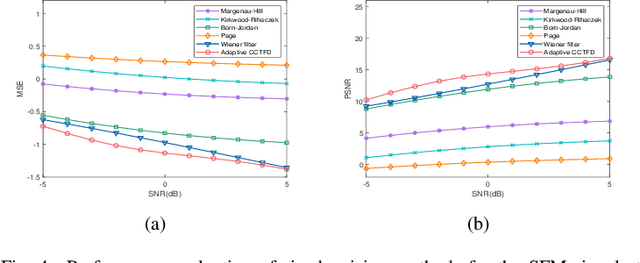
Abstract:The fixed kernel function-based Cohen's class time-frequency distributions (CCTFDs) allow flexibility in denoising for some specific polluted signals. Due to the limitation of fixed kernel functions, however, from the view point of filtering they fail to automatically adjust the response according to the change of signal to adapt to different signal characteristics. In this letter, we integrate Wiener filter principle and the time-frequency filtering mechanism of CCTFD to design the least-squares adaptive filter method in the Wigner-Ville distribution (WVD) domain, giving birth to the least-squares adaptive filter-based CCTFD whose kernel function can be adjusted with the input signal automatically to achieve the minimum mean-square error denoising in the WVD domain. Some examples are also carried out to demonstrate that the proposed adaptive CCTFD outperforms some state-of-the-arts in noise suppression.
Convolution Type of Metaplectic Cohen's Distribution Time-Frequency Analysis Theory, Method and Technology
Aug 08, 2024Abstract:The conventional Cohen's distribution can't meet the requirement of additive noises jamming signals high-performance denoising under the condition of low signal-to-noise ratio, it is necessary to integrate the metaplectic transform for non-stationary signal fractional domain time-frequency analysis. In this paper, we blend time-frequency operators and coordinate operator fractionizations to formulate the definition of the metaplectic Wigner distribution, based on which we integrate the generalized metaplectic convolution to address the unified representation issue of the convolution type of metaplectic Cohen's distribution (CMCD), whose special cases and essential properties are also derived. We blend Wiener filter principle and fractional domain filter mechanism of the metaplectic transform to design the least-squares adaptive filter method in the metaplectic Wigner distribution domain, giving birth to the least-squares adaptive filter-based CMCD whose kernel function can be adjusted with the input signal automatically to achieve the minimum mean-square error (MSE) denoising in Wigner distribution domain. We discuss the optimal symplectic matrices selection strategy of the proposed adaptive CMCD through the minimum MSE minimization modeling and solving. Some examples are also carried out to demonstrate that the proposed filtering method outperforms some state-of-the-arts including Wiener filter and fixed kernel functions-based or adaptive Cohen's distribution in noise suppression.
 Add to Chrome
Add to Chrome Add to Firefox
Add to Firefox Add to Edge
Add to Edge